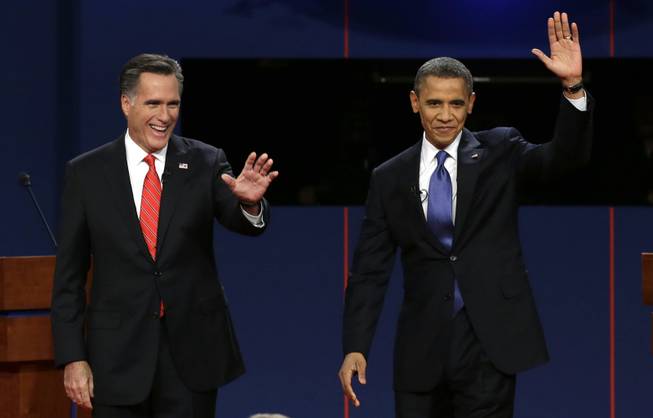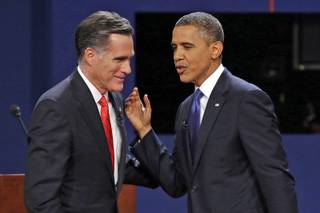
Charlie Neibergall / AP
Republican presidential nominee Mitt Romney and President Barack Obama wave to the audience during the first presidential debate at the University of Denver, Wednesday, Oct. 3, 2012, in Denver.
Published Wednesday, Oct. 3, 2012 | 5:01 p.m.
Updated Wednesday, Oct. 3, 2012 | 9:30 p.m.
Las Vegans react to the presidential debate
KSNV reports the reactions of President Barack Obama supporters and presidential candidate Mitt Romney supporters during the debate, Oct. 3.
In their first debate, President Barack Obama and presidential nominee Mitt Romney spared no charge in accusing each other of being uniquely out of touch, unprepared and even deceitful about their plans for the next four years.
On a night when they were nearly indiscernible in how they described themselves — each claiming to be a champion of educational investment, energy development and a fairer tax code — the two created much more of a contrast when talking about each other.
“How do we deal with our tax code — this is where there’s a difference,” Obama said during the opening segment on the economy. “Gov. Romney’s central economic plan calls for a $5 trillion tax cut on top of the extension of the Bush tax cuts, that’s another million, and $2 trilion in additional military spending that the military hasn’t asked for.
“How do you do that without dumping on the middle class?” Obama continued. “If you are lowering the rates as you describe, governor, it is not possible to come up with enough deductions and loopholes ... It’s math. It’s arithmetic.”
“I don’t have a $5 trillion tax cut. I don’t have a tax cut. My view is that we have to provide tax relief to people in the middle class,” Romney retorted. “Virtually everything he described of my plan is inaccurate ... There’s no economist that can say ‘Mitt Romney will add $5 trillion to the deficit’ if I say I will not add to the deficit with my tax plan.”
“For 18 months he’s been running on this tax plan and now five weeks before the election he’s saying that his big bold idea is: Nevermind,” Obama answered.
The volley went the other way when it came to energy.
“Gov. Romney and I agree that we’ve got to boost natural gas production ... but I also believe that we’ve got to look at the energy sources of the future, wind and solar, and make those investments,” Obama said, raising the subject of subsidies for oil and gas companies that he believes should be cut — normally a winning line for Democrats.
“In one year you provided $90 billion in breaks to the green energy world,” Romney shot back. “I like green energy as well, but that’s about 50 years worth of what the oil and gas industry receives ... $90 billion? That would have hired 2 million teachers.”
Obama and Romney were well-matched as they sparred largely unchecked, except for a few reminders about the clock, from moderator Jim Lehrer.
Romney appeared more relaxed than Obama, who was noticeably agitated by Romney’s characterization of his record and protestations.
Obama directed more than a few of his answers to the audience watching from home, encouraging them — at times with a hint of sarcasm — to choose between his plan and Romney’s plan, especially when it came to health care and banking regulation.
“At some point I think the American people have to ask themselves: Is the reason Gov. Romney is keeping all these plans … secret because they’re too good? Because somehow middle class families are going to benefit too much from them?” Obama asked.
Romney has come under fire on the campaign trail for failing to release detailed blueprints of how he would replace programs he has pledged to repeal, such as the “Obamacare” health care law and the banking regulation known as Dodd-Frank.
But it was Romney who delivered more of the night’s zingers.
“Mr. President, you’re entitled to your own airplane and your own house, but not your own facts,” Romney shot at Obama toward the end of the 90-minute debate.
Though the debate was the first time this election season that Obama and Romney have stood face-to-face, both were already well-rehearsed in campaigning against each other after nine months of competition.
Yet for all the substance in the debate, viewers who have been following this campaign likely learned little that was new — except, perhaps, how the candidates think under pressure.
Both candidates fell back on articulating their general economic philosophies, rather than providing new details on their proposed policies.
Obama accused Romney of floating the same trickle-down economics ideas “pitched in 2001 and 2003” by then-president George W. Bush.
“We had the slowest job growth and it all culminated in the greatest recession since the Great Depression,” Obama said.
Romney bristled at at Obama characterizing his economic “as a top-down cut taxes for the rich” approach.
“That’s not what we’re going to do,” Romney said.
He accused Obama of promoting a recipe of “big government taxing more, spending more — if you will, trickle-down government.”
Romney and Obama both came armed with numbers to bolster their cases.
When Romney accused Obama of nearly doubling the deficit, Obama let rip a tally sheet of his government-trimming activity while in office: 77 government programs cut, including 18 education programs, and $50 billion in wasteful spending “taken out of the system.”
“We all know that we’ve got to do more, so I put forward a specific $4 trillion deficit reduction plan,” Obama added.
“I love it — you found $4 trillion in ways to get closer to a balanced budget but we’re still a trillion in deficit every year,” Romney replied. “The economy is still growing slowly — in fact it’s growing more slowly now than when you made that statement ... you raise taxes and you kill jobs.”
Romney also stressed his numbers when it came to protecting Medicare.
“For current retirees, [Obama]’s cutting $716 billion from the program. Just going to (health care providers) and saying ‘we’re going to reduce the rates you get paid,’” Romney said. “Some 15 percent of hospitals and nursing homes say they won’t take anymore Medicare patients under that scenario.”
Obama fired back that the Republicans’ “voucher-style” Medicare program would put the burden of increasing health care costs on seniors instead.
“The problem is because the voucher wouldn’t necessarily keep up with health care inflation,” Obama said. “The estimate is that it would [force seniors to] come up with $6,000 a year.”
Perhaps the most noticeable dynamic of the debate was the lack of a strong moderator. Lehrer routinely let the candidates delve into the nitty-gritty of health care and taxes, largely ignoring their time constraints.
While the candidates blew their time limits, many other domestic policy questions never received a hearing.
Immigration, for example, was never brought up.
Housing was, but only in passing as the candidates discussed how subprime lending had contributed to the economic crisis. And how each candidate might approach replacing the two or three Supreme Court justices likely up for retirement? Nada.
The candidates have two more opportunities to debate. On Oct. 16 they will spar over both foreign and domestic policy. On Oct. 22, the debate will be focused solely on foreign policy.
The vice presidential candidates meet on Oct. 11.
But even with the additional debates on the calendar, not all Nevadans may actually tune in to hear the candidates’ closing arguments. Early voting will have already opened by the time they face off in their last debate.


Join the Discussion:
Check this out for a full explanation of our conversion to the LiveFyre commenting system and instructions on how to sign up for an account.
Full comments policy